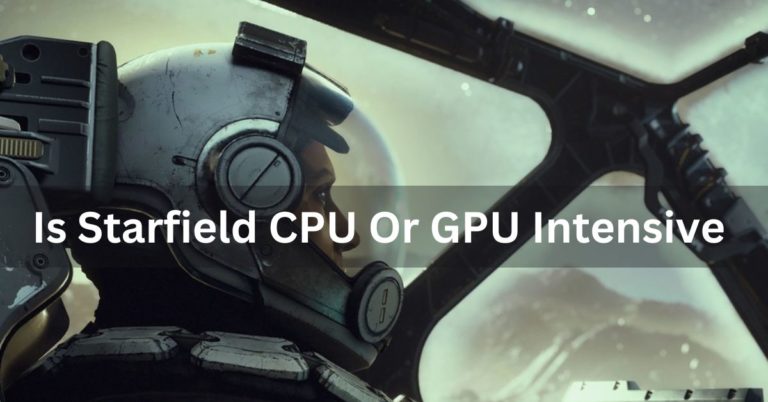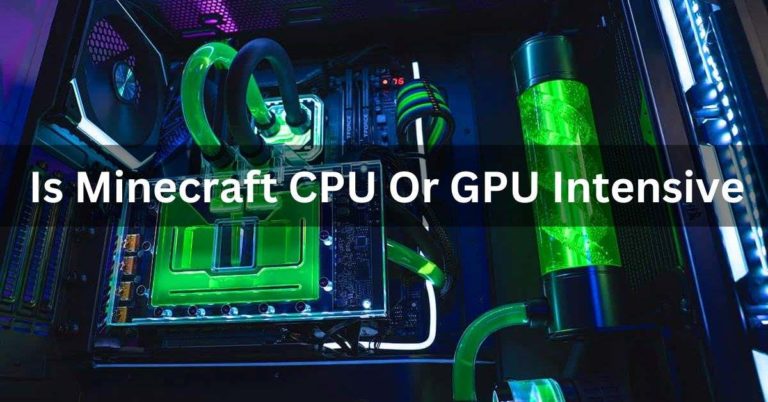Is Rust CPU or GPU Heavy – Complete Guide – 2024
Rust, a modern programming language developed by Mozilla, has gained significant popularity due to its emphasis on safety, concurrency, and performance.
Rust is more CPU-heavy than GPU-heavy. It relies heavily on the central processing unit (CPU) for most tasks rather than the graphics processing unit (GPU).
In this article, As developers explore Rust’s capabilities, one common question arises: Is Rust CPU or GPU-heavy?
Introduction to Rust Programming Language:
Before delving into whether Rust is CPU or GPU-heavy, it’s essential to understand the basics of the language.
Rust is renowned for its memory safety features and zero-cost abstractions, making it a compelling choice for systems programming, embedded devices, and performance-critical applications.
Understanding CPU and GPU:
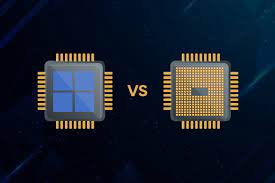
Central Processing Units (CPUs) and Graphics Processing Units (GPUs) are both essential components of modern computing architectures.
CPUs excel at handling sequential tasks and complex calculations, while GPUs are optimized for parallel processing and graphics-intensive workloads.
Is Rust CPU Heavy?
Rust’s impact on CPU performance primarily depends on how efficiently it manages memory and executes computations.
While Rust’s emphasis on safety incurs some overhead, its performance characteristics often rival those of traditional systems languages like C or C++. Rust’s ability to optimize code and leverage multi-threading can lead to efficient CPU utilization in various scenarios.
Is Rust GPU Heavy?
Unlike languages explicitly designed for GPU computing like CUDA or OpenCL, Rust’s GPU capabilities are not as pronounced.
However, Rust offers libraries and frameworks for GPU programming, allowing developers to harness the power of graphics processors efficiently. Rust’s ecosystem is evolving, and with advancements in GPU support, its potential for GPU-heavy tasks continues to grow.
Is Rust CPU or GPU Heavy?
Exploring Rust’s Performance:
Rust’s performance characteristics depend on various factors, including its utilization of CPU and GPU resources. Unlike languages like C or C++, Rust provides memory safety without sacrificing performance, thanks to its ownership model and borrow checker.
CPU Intensive Operations in Rust.

Rust is well-suited for CPU-intensive tasks due to its efficient memory management and low-level control. Algorithms, data processing, and mathematical computations can be implemented in Rust with high performance and reliability, leveraging the full potential of the CPU.
GPU Intensive Operations in Rust:
While Rust’s primary focus is on CPU-based computations, it also offers support for GPU programming through libraries like gfx-rs and wgpu.
Developers can harness the power of GPUs in Rust for tasks such as parallel processing, scientific computing, and machine learning.
Factors Affecting Rust’s Performance:
Several factors influence Rust’s performance across CPU and GPU environments:
1. Parallelism and Concurrency:
Rust’s concurrency model allows developers to write concurrent code that takes advantage of multi-core processors efficiently. Rust enables scalable and responsive applications by leveraging constructs like threads and async/await syntax.
2. Memory Management:
Rust’s ownership system eliminates common memory-related bugs like null pointers and data races. By enforcing strict rules at compile-time, Rust ensures memory safety without runtime overhead, resulting in efficient memory utilization across CPU and GPU workloads.
3. Optimization Techniques:
Optimizing Rust code involves techniques such as loop unrolling, inline assembly, and compiler optimizations. By fine-tuning performance-critical sections of code, developers can achieve significant speedups in both CPU and GPU-bound applications.
Comparison with Other Programming Languages:
Compared to traditional languages like C, C++, and Python, Rust offers a unique balance of safety and performance. While C and C++ provide low-level control and minimal runtime overhead, they lack Rust’s memory safety guarantees.
On the other hand, Python prioritizes developer productivity over raw performance, making it less suitable for CPU and GPU-intensive tasks.
Is Rust Running Slow? How to Make Rust Load Faster?
Rust’s speed isn’t inherently slow, but optimizing code can improve performance. To make Rust load faster, utilize techniques like code profiling, optimizing algorithms, and leveraging Rust’s concurrency features. These strategies enhance efficiency and reduce loading times.
Rust’s GPU Utilization:
Rust’s GPU utilization depends on the libraries and frameworks used. Rust supports GPU programming via crates like ‘gfx-hal’ and ‘wgpu’. Leveraging these, developers can harness GPU power for tasks like parallel processing, rendering, and machine learning.
Rust’s CPU Utilization:
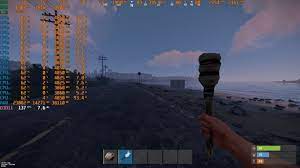
Rust’s CPU utilization relies on how efficiently code is written and executed. Leveraging Rust’s features like zero-cost abstractions and safe concurrency primitives can optimize CPU usage.
Additionally, profiling tools aid in identifying and addressing performance bottlenecks for improved CPU utilization.
Why Is Rust Running Slow? 5 Possible Reasons
Rust may run slow due to inefficient algorithms, excessive memory usage, suboptimal code organization, lack of compiler optimizations, or inefficient I/O operations. Profiling tools help identify these bottlenecks, enabling developers to optimize performance effectively.
How to Speed Up Rust: 10 Tips
- Profile code to identify bottlenecks.
- Optimize algorithms and data structures.
- Utilize Rust’s concurrency features.
- Employ compiler optimizations.
- Minimize unnecessary memory allocations.
- Use efficient I/O operations.
- Leverage crates for performance-critical tasks.
- Avoid unnecessary cloning.
- Opt for stack allocation when feasible.
- Stay updated with Rust’s latest features and best practices.
What are the system specifications for Rust?
Rust doesn’t have specific system requirements; it runs on various platforms including Windows, macOS, and Linux. Basic requirements include a compatible operating system and sufficient hardware resources.
Flipboard not loading Articles: Fixes & Workarounds
Sure, here are the points for fixing Flipboard’s article loading issue:
- Restart the app or refresh the page.
- Check your internet connection.
- Clear cache and data.
- Update the Flipboard app.
- Consider reinstalling Flipboard if issues persist.
What does hover note mean in Minecraft?
In Minecraft, a hover note refers to a tooltip that appears when you hover your cursor over an item or block in the game. It provides brief information about the item’s properties, such as its name, usage, or characteristics.
How to Make Rust Load Faster If None of This Works?
If Rust still loads slowly despite optimizations, consider upgrading hardware like RAM or switching to faster storage devices.
Additionally, ensure background processes aren’t consuming resources excessively. If the issue persists, seek guidance from Rust community forums or consider professional assistance for further troubleshooting.
Make Ram Stop Bottle Necking Rust.
To alleviate Rust’s bottlenecking due to RAM limitations, upgrade to faster and larger RAM modules compatible with your system.
Opting for higher capacity and faster memory speeds can significantly enhance Rust’s performance, reducing bottlenecks and improving overall responsiveness.
(RUST) PC not using all GPU, CPU, and Ram available – RTX 2080 TI with I9-9900k.
If your (RUST) PC isn’t utilizing all available GPU, CPU, and RAM resources with an RTX 2080 Ti and an i9-9900K, ensure drivers are up-to-date, check for background processes, monitor system temperatures, and optimize in-game settings for better resource utilization.
Additionally, consider tweaking system configurations for optimal performance.
Where Is My Bottleneck On Rust?
Identifying the bottleneck in Rust requires monitoring CPU, GPU, and RAM usage. Use performance monitoring tools to analyze resource usage during gameplay. If CPU usage is consistently high, it might be the bottleneck. Similarly, GPU or RAM saturation indicates respective bottlenecks.
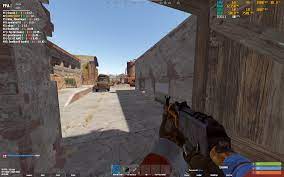
Faqs:
1. Is Rust more CPU or GPU intensive?
Rust needs a good CPU to handle its calculations and processes, like generating the game world and managing AI. However, it also relies on the GPU for rendering graphics and displaying the game world.
2. When you benchmark your computer, is it more CPU or GPU intensive?
When you test your computer’s performance, it depends on what you’re doing. Tasks like calculations and running programs often need more CPU power, while tasks involving graphics need more GPU power.
3. Does CPU matter when rendering with GPU?
Yes, the CPU still matters when rendering with the GPU because it handles tasks like preparing data for rendering and coordinating the overall process, even though the GPU does the heavy lifting.
4. Is streaming GPU or CPU intensive?
Streaming is more CPU intensive because it involves tasks like encoding video and managing network connections. While the GPU can help with certain tasks, the CPU plays a bigger role in streaming.
5. Is Rust game worth starting to play now?
Whether Rust is worth starting to play now depends on your preferences. It offers intense survival gameplay and a vibrant community. Consider its challenging nature and potential for memorable experiences before deciding.
6. Is Yuzu CPU or GPU intensive?
Yuzu is more CPU-intensive due to its emulation of Nintendo Switch games, which relies heavily on CPU processing power to accurately emulate the console’s architecture and execute game code.
7. Can you use a CPU like a GPU? If you can, will the results be optimal?
While CPUs and GPUs serve different functions, some tasks can be offloaded to CPUs, especially with technologies like SIMD (Single Instruction, Multiple Data). However, GPUs excel in parallel processing tasks, so using a CPU like a GPU may not yield optimal results.
8. How important are the CPU and GPU when building a gaming computer? Which one should be prioritized first if money isn’t an issue?
Both CPU and GPU are vital for gaming. If money isn’t an issue, prioritize the GPU first for better gaming performance, as it handles rendering and graphics processing, influencing the overall gaming experience significantly.
9. What determines when a CPU or GPU is used?
The determination of whether a CPU or GPU is used depends on the nature of the task. Generally, CPUs handle general-purpose computing tasks and managing system operations, while GPUs excel at parallel processing and graphical tasks.
10. What is good about the video game Rust?
Rust is praised for its intense survival gameplay, player interaction, and dynamic world. Its crafting system, base-building mechanics, and constant updates contribute to its popularity among gamers seeking challenging and immersive experiences.
Conclusion:
In conclusion, Rust, the modern programming language, predominantly relies on the CPU for intensive tasks, though it offers GPU support. With its emphasis on safety and performance, Rust’s efficiency lies in its memory management and optimization techniques. Whether gaming or programming, understanding CPU and GPU dynamics is crucial for maximizing performance.




